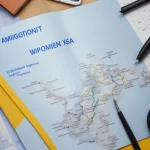AI-Powered Emergency Response for OFWs: Smart Apps for Crisis Situations Abroad
A Lifeline in the Digital Age
For millions of Filipinos working abroad, the promise of a better life often comes with inherent risks, a reality underscored by the vulnerabilities inherent in navigating unfamiliar territories. From grappling with new languages and cultural norms to the ever-present threat of emergencies far removed from familial support, Overseas Filipino Workers (OFWs) face unique challenges that demand innovative solutions. But a new wave of technology is offering a crucial lifeline: AI-powered emergency response apps meticulously designed to provide instant assistance in crisis situations.
These smart applications transcend the limitations of mere tools; they represent potential lifesavers, offering a sophisticated blend of real-time support, critical information access, and a direct connection to vital assistance precisely when it’s needed most. As OFWs increasingly rely on digital solutions to manage various aspects of their lives abroad, the strategic integration of AI into emergency response systems marks a significant leap forward in bolstering their overall safety and well-being. Consider the case of an OFW in a non-English speaking country facing a medical emergency.
Traditional emergency services might be hampered by language barriers, delaying critical care. An AI-powered app, however, could instantly translate the OFW’s distress call, pinpoint their precise location via GPS, and connect them directly with a translator-equipped medical professional or dispatch emergency services with accurate location details. This immediate access to multilingual support and precise location tracking can dramatically reduce response times and significantly improve outcomes in critical situations. The development and deployment of such apps are not merely technological advancements; they are ethical imperatives, reflecting a commitment to safeguarding the well-being of those who contribute significantly to the Philippine economy.
Furthermore, these AI-powered OFW emergency assistance applications are evolving beyond simple call-for-help functions. Many now incorporate features like real-time safety alerts based on aggregated data from local news, social media, and even crime reports. Imagine an app proactively warning an OFW about a developing protest near their workplace, allowing them to avoid the area and potential danger. This proactive approach, driven by AI’s ability to analyze vast amounts of data and identify potential threats, represents a paradigm shift from reactive emergency response to preventative safety measures. This shift highlights the potential of smart technology to anticipate and mitigate risks, ultimately contributing to a safer and more secure experience for Filipino workers abroad. The integration of such features underscores the increasing sophistication and value of AI-driven solutions in addressing the complex safety needs of OFWs.
Instant Assistance, Personalized Support
At the heart of these AI-driven apps lies the ability to provide immediate, personalized support, a critical advantage in emergency situations. Traditional emergency services, while essential, can be slow to respond, especially in unfamiliar territories where language barriers and logistical challenges exist. AI overcomes these hurdles inherent in Overseas Filipino Workers safety by offering features like instant translation, precise location tracking via GPS, and direct connection to local emergency services, bypassing traditional call centers. For example, an OFW facing a medical emergency in a non-English speaking country can use the app to translate their symptoms into the local language, pinpoint their location with pinpoint accuracy, and alert local paramedics, all within seconds.
This rapid response capability, a cornerstone of effective OFW emergency assistance, can be the difference between a manageable situation and a life-threatening crisis. Some apps even incorporate AI-powered chatbots that can guide users through basic first aid procedures or provide critical information about local laws and customs while waiting for help to arrive. These chatbots can understand and respond in multiple languages, including Tagalog and other Filipino dialects, ensuring clear communication during stressful situations. Furthermore, the personalized support extends to providing culturally sensitive advice, recognizing that what constitutes an emergency and how it’s handled can vary significantly across different cultures.
This level of nuanced understanding is invaluable for Overseas Filipino Workers navigating unfamiliar environments. These AI for OFWs tools represent a significant advancement in digital safety for Filipino workers abroad. Beyond immediate assistance, these AI-powered apps are also revolutionizing crisis response by providing personalized safety recommendations based on the OFW’s location, travel history, and even social media activity. For instance, an app might alert a user to avoid a certain area due to a reported increase in crime or provide guidance on how to navigate a local protest safely. This proactive approach to OFW support empowers users to make informed decisions and avoid potentially dangerous situations. Moreover, the data collected through these apps can be used to identify trends and patterns in OFW emergencies, allowing support organizations and government agencies to develop more effective safety programs and resources. This makes smart technology a crucial component of ensuring the well-being of Filipino workers abroad.
Proactive Safety, Predictive Alerts
Beyond immediate crisis response, these AI-powered apps are increasingly focusing on proactive safety measures, a critical component of Overseas Filipino Workers safety. Many incorporate sophisticated AI-driven risk assessment tools that continuously analyze a multitude of data streams, including local news feeds, social media chatter, crime statistics from law enforcement agencies, and even environmental data, to identify potential threats in the user’s immediate vicinity or along planned routes. This information is then processed using machine learning algorithms to generate real-time alerts about potential dangers, such as impending protests, natural disasters like typhoons or earthquakes, areas identified as crime hotspots, or even health advisories related to disease outbreaks.
The granularity and speed of these alerts offer a significant advantage over traditional warning systems, providing OFWs with crucial time to react and avoid potentially dangerous situations. This proactive approach is a significant leap forward in ensuring OFW emergency assistance, moving beyond reactive measures to preventative strategies. Some AI-powered apps go even further, offering personalized safety recommendations tailored to the user’s specific location, travel plans, and even personal risk profile. For instance, an OFW planning a trip to a new city might receive automated alerts about areas with historically high crime rates, suggestions for safe and reliable transportation options vetted through user reviews and real-time tracking data, and even culturally sensitive advice on how to avoid drawing unwanted attention.
These recommendations are not static; they dynamically adjust based on changes in the environment and new information gathered by the AI. Consider the hypothetical app ‘BantayBayan AI,’ which could use machine learning to predict areas with a high risk of petty theft based on historical data, user reports, and even real-time analysis of CCTV feeds, providing alternative routes to users in real-time and suggesting secure methods for carrying valuables. This level of personalized digital safety represents a significant advancement in OFW support, leveraging smart technology to empower Filipino workers abroad to make informed decisions and mitigate risks.
Furthermore, the predictive capabilities of these AI systems are constantly improving. By analyzing patterns and trends in vast datasets, these apps can anticipate potential emergencies before they even occur. For example, an AI might detect an increase in social media posts related to a planned protest in a specific area and proactively warn users to avoid that location, even if the protest has not yet been officially announced. Similarly, by monitoring weather patterns and seismic activity, these apps can provide early warnings about impending natural disasters, giving OFWs valuable time to evacuate or take necessary precautions. This predictive capability is particularly crucial in regions prone to natural disasters or political instability, offering a vital layer of protection for Overseas Filipino Workers. The integration of AI for OFWs extends beyond simple alerts; it’s about creating a dynamic safety net that anticipates and mitigates potential threats before they materialize, ensuring the well-being of Filipino workers abroad.
Collaboration and Integration: A Comprehensive Safety Net
The effectiveness of AI-powered emergency response apps hinges on collaboration and integration, forming a comprehensive safety net for Overseas Filipino Workers. Many apps strategically partner with local authorities, Philippine embassies, and OFW support organizations. This multifaceted collaboration ensures that users gain access to a wide array of resources, ranging from legal assistance and medical care to crucial repatriation services. For example, an app might instantly connect an OFW facing legal trouble abroad with a lawyer specializing in international labor law, or it could provide immediate access to a curated database of accredited medical facilities and healthcare professionals proficient in Tagalog or other Philippine dialects within their vicinity.
This collaborative ecosystem amplifies the reach and impact of these AI-powered tools, making them indispensable for OFWs navigating complex and potentially dangerous situations. Furthermore, some AI-powered apps integrate seamlessly with existing government services, streamlining access to vital support systems. This allows users to report incidents directly to the Philippine Overseas Labor Office (POLO) or the Overseas Workers Welfare Administration (OWWA) with just a few taps on their smartphones. Imagine an Overseas Filipino Worker facing workplace harassment; through the app’s integration, they can instantly file a report with POLO, attaching relevant documents and evidence directly from their device.
This seamless integration not only expedites the process of seeking help but also ensures that OFWs receive the necessary support from both local and Philippine authorities, bridging geographical divides and bureaucratic hurdles. Such digital safety nets are critical for Filipino workers abroad. Beyond direct assistance, these collaborations extend to proactive measures aimed at preventing crises before they occur. Some AI-powered apps are now incorporating features that leverage partnerships with local NGOs and community watch groups.
This allows for the dissemination of localized safety advisories and real-time updates on potential threats, such as disease outbreaks or civil unrest. For instance, an app might alert OFWs in a specific city about a surge in petty theft incidents reported by local residents, advising them to take extra precautions. This proactive approach, fueled by collaborative intelligence, empowers Overseas Filipino Workers with the knowledge and resources they need to stay safe and secure in unfamiliar environments. The future of OFW emergency assistance relies on these integrated, collaborative platforms.
The Future of OFW Safety: Addressing Challenges, Embracing Innovation
As AI technology continues to evolve, the potential for these emergency response apps to revolutionize OFW emergency assistance is immense. Future iterations could incorporate advanced features like facial recognition for swiftly identifying missing persons, a critical capability given the reports of exploitation and human trafficking affecting Overseas Filipino Workers safety. Predictive policing algorithms, trained on localized crime data, could proactively alert OFWs to high-risk areas, enabling them to avoid potentially dangerous situations. Imagine AI-powered drones equipped with medical supplies and communication devices, capable of delivering aid to OFWs stranded in disaster zones or remote locations where traditional emergency services struggle to reach.
These advancements promise a future where technology acts as a vigilant guardian, ensuring the well-being of Filipino workers abroad. However, realizing this vision requires careful consideration of potential challenges. Data privacy concerns are paramount; robust safeguards must be implemented to protect sensitive user information from unauthorized access or misuse. The digital divide also poses a significant obstacle, as many OFWs, particularly those in lower-paying jobs or remote areas, may lack access to smartphones or reliable internet connectivity.
To ensure that these AI-powered apps benefit all OFWs, regardless of their socioeconomic status or technical literacy, developers and policymakers must prioritize digital inclusion initiatives, such as providing subsidized devices and affordable data plans. Furthermore, culturally sensitive design is essential; the apps must be available in multiple languages and tailored to the specific needs and customs of different OFW communities. Addressing the psychological impact of emergencies is another crucial area for development. Future iterations of OFW support apps could incorporate AI-powered chatbots trained to provide emotional support and counseling to OFWs experiencing distress.
These chatbots could offer a safe and anonymous space for OFWs to share their concerns, access mental health resources, and connect with trained counselors. Moreover, AI could be used to analyze social media posts and online forums to identify OFWs who may be at risk of suicide or self-harm, enabling timely intervention and support. By integrating mental health support into emergency response apps, we can create a more holistic and compassionate safety net for Overseas Filipino Workers.
The future of OFW safety hinges on smart technology, accessible, and ethically developed AI solutions that empower them to navigate the challenges of working overseas with confidence and peace of mind. This requires fostering collaboration between technology developers, government agencies like the Overseas Workers Welfare Administration (OWWA), and OFW support organizations. By working together, these stakeholders can ensure that AI-powered apps are continuously improved, effectively address the evolving needs of OFWs, and contribute to a safer and more secure environment for Filipinos working abroad. Investment in research and development is also crucial to explore new and innovative applications of AI for OFW safety, ensuring that the Philippines remains at the forefront of this critical field. The goal is to create a comprehensive ecosystem of digital safety that protects and empowers every Filipino worker abroad.


